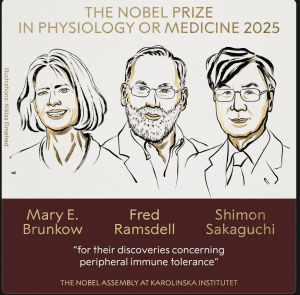The 2025 Nobel Prize in Physiology or Medicine has been awarded to Mary E. Brunkow, Fred Ramsdell, and Shimon Sakaguchi (Figure 1) for their landmark discoveries revealing how the immune system maintains self-tolerance, the ability to recognize and spare the body’s own tissues while targeting pathogens and cancer. Their work uncovered the mechanisms by which immune regulation is achieved through regulatory T cells (Tregs) and the gene FOXP3, transforming our understanding of immune control and paving the way for new treatments in autoimmunity, cancer, and transplantation medicine.
The discovery of immune tolerance
The immune system’s role extends beyond attacking invaders; it must also regulate itself to prevent autoimmunity. In the late 1980s, Shimon Sakaguchi at the University of Osaka resolved a decades-old mystery surrounding the thymus, the organ where immune cells mature. He demonstrated that removing the thymus from newborn mice led to catastrophic autoimmune disease, revealing that the thymus produces a special subset of T cells that actively suppress self-reactive immune responses.
These regulatory T cells (Tregs) emerged as the immune system’s key moderators, a population essential for maintaining tolerance and preventing immune-driven tissue damage. Their identification redefined the immune landscape, showing that immunity depends as much on restraint as on attack.
Building on this foundation, Mary Brunkow and Fred Ramsdell in Seattle identified the genetic switch responsible for Treg development. While studying mice that developed severe autoimmune disease, they discovered that a mutation in a single gene, FOXP3, prevented the formation of functional Tregs. The same mutation was later linked to a rare and devastating human disorder, IPEX syndrome, confirming FOXP3 as the master regulator of immune tolerance.
This finding established the molecular basis of Treg biology and illuminated how the immune system distinguishes self from non-self at the genomic level. The FOXP3 gene now stands as one of the most important regulators in immunology, controlling a network of genes that suppress inflammation and maintain immune homeostasis.
From fundamental discovery to therapeutic frontier
The laureates’ discoveries underpin much of today’s immunotherapy research. Regulatory T cells and FOXP3 form the conceptual framework for manipulating the immune system in a wide range of diseases. In autoimmune disorders, scientists aim to boost or restore Treg function to halt immune self-attack. In cancer, where tumours exploit Tregs to evade immune surveillance, therapies seek to inhibit or reprogram them to enhance anti-tumour immunity. In transplantation medicine, Treg modulation is being explored to promote tolerance and reduce dependence on immunosuppressive drugs.
More than 200 clinical trials worldwide are directly inspired by these findings, representing a new generation of therapies that fine-tune rather than simply suppress the immune system.
A transformative legacy
The discoveries honoured by this year’s Nobel Prize represent one of the most profound conceptual advances in modern medicine. By revealing how the immune system enforces tolerance, the laureates provided the foundation for a new era of precision immunotherapy, one that seeks not only to strengthen immune attack when needed but also to restore balance when it falters.
Their work continues to influence nearly every aspect of immunological research, from the development of cancer immunotherapies to the design of next-generation treatments for autoimmune and inflammatory diseases. The 2025 Nobel Prize thus recognizes discoveries that bridge basic science and clinical medicine, redefining the immune system as a self-regulating ecosystem, one that protects, corrects, and sustains the body throughout life.
Profiles of the laureates
Shimon Sakaguchi, born in Nagahama, Japan, is a distinguished professor at the University of Osaka and one of the most influential figures in modern immunology. His early work on thymic T cells redefined immune regulation and established a cornerstone of tolerance biology.
Mary E. Brunkow earned her PhD in molecular biology from Princeton University and later joined the Institute for Systems Biology in Seattle, where she continues to study genomic regulation in immune-mediated disease.
Fred Ramsdell, who holds a PhD in immunology from the University of California, Los Angeles, is the co-founder and scientific adviser at Sonoma Biotherapeutics. His work focuses on translating Treg-based discoveries into cellular therapies for autoimmune diseases.
Summary by Stefan Botha











